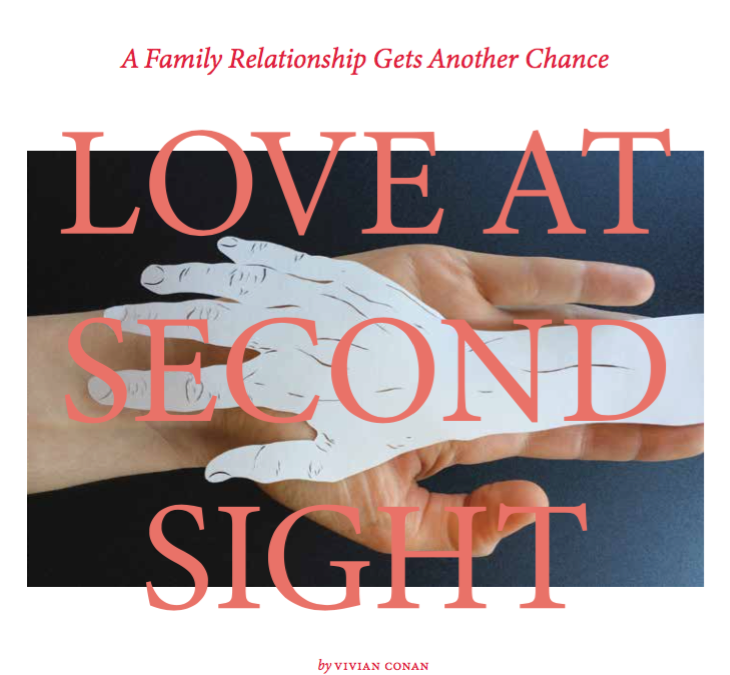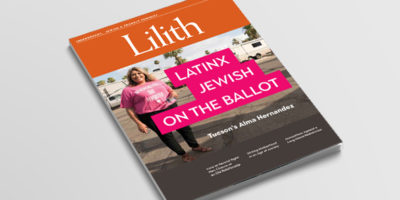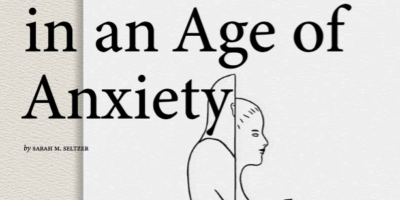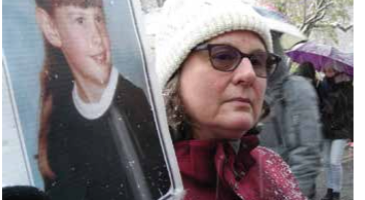
Love at Second Sight
When I was a child, my mother gave me orange slices to suck when I threw up, to take away the bad taste. She sat on the floor, pincushion in hand, to shorten the hemline of my junior-high graduation dress. Other times, she turned my world upside down by screaming, “Get out of my sight, you fucking bastard! Go shit in your hat! Your name is Mud!” She hit me with a wooden hanger sometimes because, “It hurts me when I hit with my hand.” She also tried, with varying degrees of success, to act as a buffer between my strict father and me. In this, I felt we were allies.
Our relationship was complicated.
One afternoon when I was 15, I was shopping on Brooklyn’s Bay Parkway with my mother’s cousin Mildred. All at once, she clutched my arm and said, “Doesn’t that man look exactly like your mother’s first husband?”
Mildred had always been a little off. “My mother was never married before,” I said.
“You didn’t know?”
An hour later, my mother confirmed Mildred’s story with a simple, “Yes, I was.” My initial shock turned to joy at the implication. Only days before, I’d asked why she tolerated all my father’s raging and irrational rules. “I’m surviving,” she’d said, “I’m coping.” She spoke as if she had met her goal. She didn’t realize I was asking why she tolerated it for the whole family, not just herself.
“Who’s my real father?” I asked, “Daddy or your first husband?”
“Daddy. I didn’t have children in my first marriage.”
That ended my interest.
We didn’t discuss it again for 45 years.
When I was 30 and my mother was in her late 50s she retired from a career as an educator. Listening to the PTA president’s speech at her party, I gained a new respect for her. “When Mrs. Conan came to this school, our children could not read. Now our children read!” she said.
My mother soon started a new career, as an interviewer with the Social Security Administration. She also embarked on what would become a decades-long quest for personhood, reading self-help books and filling index cards with sayings like, “We expect from each other only what we are able to give of ourselves.” Over the years, I had felt alternately angry and cordial toward my mother, though never really close. Now I sensed she longed for a deeper relationship. While I understood what she was doing, I wasn’t ready for more intimacy. She didn’t push it.
Little changed until my mother’s early 80s, when she visited me for a sleepover in my summer bungalow. It was three years after my father’s death. As I was drying the dishes, she said, “On Yom Kippur, before you ask God for forgiveness, you’re supposed to ask the person you wronged. So I’m asking, do you forgive me for all the bad things I did when you were growing up?”
This took me by surprise. Our conversations usually consisted of news exchanges, telling each other about places we had been or errands we had run. I didn’t want a give-and-take beyond that.
“Yeah, I forgive you,” I said, dabbing a stray drop on a cup.
“That doesn’t sound like forgiveness.”
Her voice was one I’d never heard before. It was vulnerable. Looking up, I saw an earnest face that scared me. I wanted to bolt.
“I forgive you,” I repeated, meeting her eyes.
“That still doesn’t sound like forgiveness.”
Suddenly, I realized what a risk my mother was taking, and that she was in pain. I had the power to take it away or make it worse. I put down the towel, hugged her, and said, “I forgive you.”
She hugged me back, saying, “Now I know you mean it.”
I wasn’t sure how much I did mean it, though I was glad she thought I did, because I felt I ought to mean it. But in the months that followed, I felt lighter than I had in a long time. My mother had given me a gift. She had acknowledged that the things she’d said and done had really happened, and she knew that they were hurtful.
Until then, I had never wondered what made her the way she was. I’d been too busy surviving myself. Now I began to be curious about what had shaped her, and asked whether she would share her recollections. She was very willing to answer questions. In fact, she seemed to welcome them. Our exchanges, a few minutes here, a few there, added emotional depth to what I already knew.
My mother was the sixth of nine children born to the doting Greek-Jewish grandparents I called Nona and Papoo. I’d never imagined they might not have been that way as parents, being so preoccupied with paying the mortgage they couldn’t give much attention to any one child. My mother didn’t start school until she was seven, because Nona kept her home to care for her brother, four years younger. When she graduated from elementary school, Nona and Papoo came to the ceremony. Afterward, the three of them walked home together, the first time my mother was alone with both parents. She told me how proud she felt making her way down the block between them, for all the world to see.
Nona’s greatest wish for each of her daughters was a husband. My mother craved Nona’s approval, so, at 21, she married her college boyfriend. But Nona wasn’t pleased, because he didn’t have a job. The marriage lasted three years.
Two years later, my mother met my father. She was captivated because he spoke several languages, played chess, and listened to classical music, and because his attentions were a balm after her divorce. Nona was satisfied with my mother’s second match: he was a postal clerk. They were married in four months.
Things deteriorated quickly. When my mother bought an inexpensive dress without first asking my father, he took her name off the bank account. A sewing-machine operator in a factory, she had to turn over her salary to him, and he gave her an allowance for household expenses.
Then came World War II. My father left for Europe when I was two and my brother just days old. Within weeks, my mother got a job as a substitute teacher and opened her own bank account. When my father returned a year later, he resumed his role as the boss at home, but my mother kept her bank account and her career.
I asked why she had never divorced him. “I didn’t want to be unmarried,” she said.
In her late 80s, my mother requested my help managing her paperwork. Once a week, I drove from Manhattan to the Brooklyn house I grew up in. We sat at a bridge table in my brother’s old room and reviewed bills and bank statements, then went out to eat. She always insisted on paying, and on giving me a little extra for myself, because “It shouldn’t cost you anything to visit your mother.”
I looked forward to these visits. My mother felt our togetherness, too. “It’s love at second sight,” she said.
One day, in the course of a meandering conversation, she mentioned her first husband. I asked how the marriage had ended. “He left me for my best friend,” she said.
I visualized my mother as a young woman feeling the pain of abandonment and lost love. “How long did it take you to get over it?” I asked.
“I never got over it,” she said.
I was stunned. The marriage had ended over 60 years ago. I asked what her husband’s name was.
“Sam Langbert,” she said.
After dinner, as I began my drive back to Manhattan, I saw my mother in my rear-view mirror, waving from the top of the stoop. When I got to my apartment, there was her usual message on my answering machine. “Vivian, this is your mother. You just left. I hope you have a safe trip home. I had a wonderful time with you. And Vivian, I love you. Iloveyou, Iloveyou, Iloveyou. Bye-bye, Vivian.”
That night, I did an Internet search for Sam Langbert. After I determined he was still living—he wasn’t in the Social Security Death Index—I looked through directories and found a listing in Florida. I called my mother and told her I had an address for a man who might be the Sam Langbert she married. “Do you want it?” I asked.
“No,” she said, “but don’t throw it out.”
A week later, she called. “Viv, if you still have that address, I’ll take it.” She wrote a letter that began, “If you are the Sam Langbert whose mother lived on 18th Avenue in Brooklyn and whose father had a shoe-repair shop on 34th Street in Manhattan, near Macy’s, then I was your wife.”
Sam’s reply arrived in eight days. He wrote that he had thought of her often, she was a fine person, and he felt bad about what he had done. Her friend left him after a few years, and he had been married several times since. “So you see, I don’t have a very good track record as a husband.”
My mother answered, telling him she had been married 52 years, her daughter was a librarian, her son a psychologist, and she had three grandsons. She wrote that she had been a school principal.
“I wanted him to know I was successful,” she told me.
I asked how she felt having gotten in touch with him after all these years.
“I finally have closure,” she said, looking more peaceful than I had ever seen her.
Two years later, just before her 90th birthday, my mother was reminiscing about her childhood. “I have a picture of my mother in my bedroom,” she said. “And I look at her, and I thank her. I thank her for being my mother. I enjoy her more now, I think, than I did when she was alive.”
I was enjoying my own mother now, and glad she was alive to know it.
Vivian Conan has written for the New York Times and New York magazine. She has just completed her memoir, Losing the Atmosphere.
=Art: “CONTACT” BY MAUDE WHITE, INSTA: @BYMAUDEWHITE




